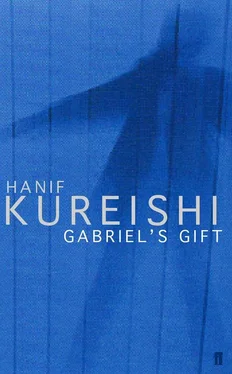Hanif Kureishi - Gabriel's Gift
Здесь есть возможность читать онлайн «Hanif Kureishi - Gabriel's Gift» весь текст электронной книги совершенно бесплатно (целиком полную версию без сокращений). В некоторых случаях можно слушать аудио, скачать через торрент в формате fb2 и присутствует краткое содержание. Год выпуска: 2001, ISBN: 2001, Издательство: Faber & Faber, Жанр: Современная проза, на английском языке. Описание произведения, (предисловие) а так же отзывы посетителей доступны на портале библиотеки ЛибКат.
- Название:Gabriel's Gift
- Автор:
- Издательство:Faber & Faber
- Жанр:
- Год:2001
- ISBN:9780571249428
- Рейтинг книги:5 / 5. Голосов: 1
-
Избранное:Добавить в избранное
- Отзывы:
-
Ваша оценка:
- 100
- 1
- 2
- 3
- 4
- 5
Gabriel's Gift: краткое содержание, описание и аннотация
Предлагаем к чтению аннотацию, описание, краткое содержание или предисловие (зависит от того, что написал сам автор книги «Gabriel's Gift»). Если вы не нашли необходимую информацию о книге — напишите в комментариях, мы постараемся отыскать её.
Gabriel's Gift — читать онлайн бесплатно полную книгу (весь текст) целиком
Ниже представлен текст книги, разбитый по страницам. Система сохранения места последней прочитанной страницы, позволяет с удобством читать онлайн бесплатно книгу «Gabriel's Gift», без необходимости каждый раз заново искать на чём Вы остановились. Поставьте закладку, и сможете в любой момент перейти на страницу, на которой закончили чтение.
Интервал:
Закладка:
However, there lived, next door, pallid television types with builders always shaking their heads on the front step. If you weren’t stabbed on the way, you could find an accurate acupuncturist on the corner, or rent a movie with subtitles. In the latest restaurants there was nothing pronounceable on the menu and, it was said, people were taking dictionaries with them to dinner. In the delis, queens in pinnies provided obscure soups for smart supper parties. Even ten years ago it was difficult to get a decent cup of coffee in this town. Now people threw a fit if the milk wasn’t skimmed to within a centimetre of its life and the coffee not picked on their preferred square foot of Arabia.
For those who knew, what really presaged a rise in house prices was the presence of film crews. Hardly a day passed without tangled wires on the pavement, people with clipboards wearing big jackets, numerous trucks, and fans, thieves and envious kids drawn by the self-importance of very little happening very slowly. Gabriel was one of those kids. To him the word ‘Action’, preceded by the particularly intriguing ‘Turn over!’, had a mesmeric effect. He couldn’t wait to use these words himself.
Because his mother worked most of the day now, and often, in the evening, didn’t come back until he was asleep, she wanted someone to keep an eye on Gabriel and look after the house. She had said to one of her women friends, ‘I’d no sooner leave a teenager alone than I would a two-year-old. In fact a teenager would get into more trouble!’
Hannah, a refugee from a former Communist country, was that restless eye, which slept, encased in the rest of her, on a futon in the living room.
‘Why have you chosen her?’ Gabriel had whisperingly enquired, the first time Hannah came to the house.
She was a big round woman, like a post-box with little legs, dressed always in widow black.
‘Unlike you, she’s incredibly cheap to run,’ was the reply. ‘What were you expecting?’
‘Julie Andrews, actually. Hannah’s fat.’
‘I know.’ She was laughing. ‘But make friends with her. If you let yourself get to know people, you might come to like them.’
‘Is that right?’
‘Please try and help me, Gabriel. I’ve never been through such a difficult time. I want us to have a good life again.’
He had to promise to try. But his mother didn’t trust him and she could have; she seemed to take pleasure in punishing him, as if she wanted to hurt everyone around her for what had happened.
Hannah was, as far as Gabriel was able to make out, from a town called Bronchitis, with a winding river called Influenza running through it. She had been recommended to them by a friend, or perhaps the person was secretly their enemy. Whatever the situation, when Hannah came to them with her Eastern European clothes and cardboard suitcase, she had nowhere else to live.
Mum had explained, in her practical way, ‘Hannah, you will have to sleep in the living room. But at least you will have accommodation, a little pocket money, and as much as you can eat.’
The words — ‘as much as you can eat’ — had proved to be unwise.
Hannah, whose only qualification with children was the possibility that she might once have been a child herself, at least knew how to eat. When she first arrived in England after spending three disoriented days in a coach admiring the motorways of Western Europe, she would walk around those heavens called supermarkets, twisting with desire and moaning under her breath like someone who had pushed a door marked Paradise rather than Tesco. To her, what people threw away would be a banquet.
Hannah could eat for England; she saw any amount of food in front of her as a challenge, a food mountain to be scaled, swallowed, flattened. Once, Gabriel found her squeezing a tube of tomato puree down her throat.
Sometimes, to tease Hannah, Gabriel would say, ‘If you could choose to have anything in the whole world to eat, what would it be?’
‘Ice-cream,’ she would say in her strange accent. ‘Um … and burgers. Pigs’ trotters. Pies. Rabbit stew. Jam. And … and … and …’
As she described her favourite meals, electric-eyed, lips moist and chest heaving, Gabriel would sketch the food. She would laugh at the drawings and pretend to eat the paper. Once he drew a picture featuring her several chins, inserting a zip into one, with half a sausage extending from it, a drop of mustard and smear of mayonnaise on the tip. This offended and upset her.
What she did like was Gabriel photographing her ‘in London’, as she put it. Recently Gabriel had been taking photographs with cheap, disposable cameras which he used like a notebook. He liked to photograph odd things: street corners; people from behind; lamp-posts; shop fronts. He took Polaroids and drew on them with a pen. He didn’t like anything too designed, too careful or artificial. Some of the pictures his father’s friend had blown up onto large sheets, which Gabriel drew and painted on.
Gabriel had noticed that whenever he picked up a camera, Hannah became watchful and would wipe her crumby mouth, plump her split ends and adjust her collar. The pictures he did take, she sent home to her family. She was quite nice to him afterwards.
Mum knew it wasn’t much fun with Hannah. At first Gabriel had refused to walk home with her. It wasn’t just that he was too old to be walked home; he didn’t want the others to know he had an ‘au pair’. In some schools the middle class — to which Gabriel almost, but not quite, belonged — was a persecuted minority, and anyone who had the misfortune to come from such a minority did all they could to disguise it. They were so loathed, the members of this class, they even had their own schools. Luckily, there were several entrances to Gabriel’s school and he could elude Hannah altogether, or just run away. But his mother became so upset that he compromised by having Hannah meet him not outside the school but on the corner; she walked home behind him. ‘I think that woman’s following us,’ his friends would say.
‘She’s one of the local madwomen,’ Gabriel would say. ‘Ignore her.’
However, she always had crisps and drinks for him, and as they neared the house and his friends went in different directions, he and Hannah would end up together.
As compensation, and to show off the benefit of her wage packet, Mum had taken him to see the Who — her favourite band — up the road at the Shepherd’s Bush Empire. Mum still knew someone from the old days connected to the band, and they had great seats in the front of the circle. ‘I hope it’s going to be loud,’ Mum had said, as they went in. It was. Afterwards, they had gone out to supper with their ears still numb. It seemed a long time ago.
Now Gabriel sat at the table eating his tea.
‘I’ll watch him, Mum,’ Hannah had promised. ‘Don’t you worry, like a vulture I will observe the bad boy.’
She did watch him; and he watched her watching him. Hannah had a queer look, for her eyes, instead of focusing on the same point in the normal way, pointed in different directions. He wondered if she might be able to watch two television programmes simultaneously, on different channels, on each side of the room.
What she could certainly do was watch TV and keep an eye on him at the same time, while pressing boiled sweets into the tight little hole beneath her nose. To ‘improve my English’ as she put it, she watched Australian soap operas continuously, so that her few English sentences had a Brisbane accent.
Even if Gabriel wasn’t doing anything wrong, one of her eyes hovered over him. His mother must have given Hannah an unnecessarily prejudiced report of the scrapes and troubles he was prone to. But to Hannah, being a kid in the first place was to be automatically in the wrong and these wrongs — which were going on all the time — had to be righted by adults who were never in the wrong since adults were, all the time, whatever they did, the Law. Perhaps her experience of Communism had given her this idea. Wherever she had obtained it, she would prefer it if Gabriel didn’t move at all, ever again. She liked it best when he wasn’t there but was somewhere else, preferably asleep and not dreaming.
Читать дальшеИнтервал:
Закладка:
Похожие книги на «Gabriel's Gift»
Представляем Вашему вниманию похожие книги на «Gabriel's Gift» списком для выбора. Мы отобрали схожую по названию и смыслу литературу в надежде предоставить читателям больше вариантов отыскать новые, интересные, ещё непрочитанные произведения.
Обсуждение, отзывы о книге «Gabriel's Gift» и просто собственные мнения читателей. Оставьте ваши комментарии, напишите, что Вы думаете о произведении, его смысле или главных героях. Укажите что конкретно понравилось, а что нет, и почему Вы так считаете.












